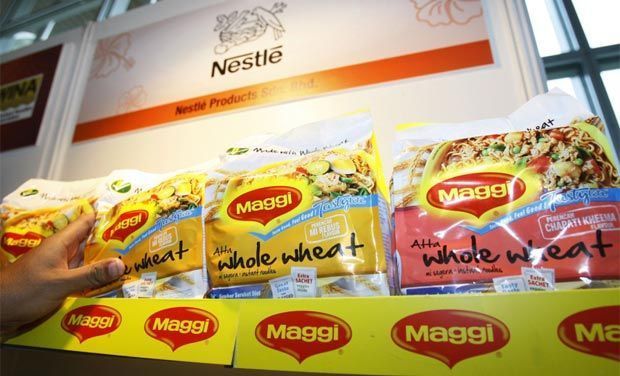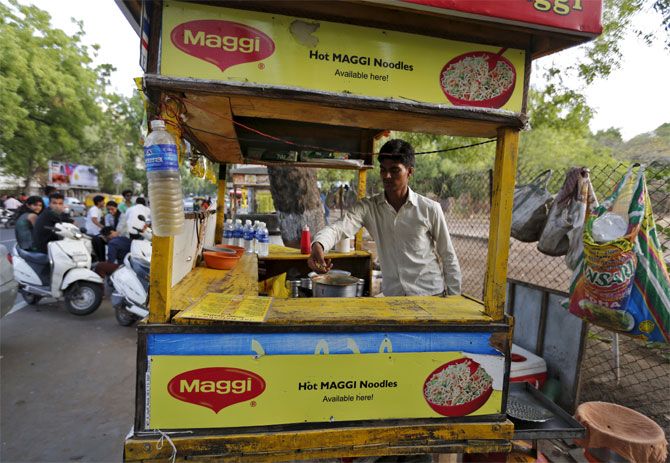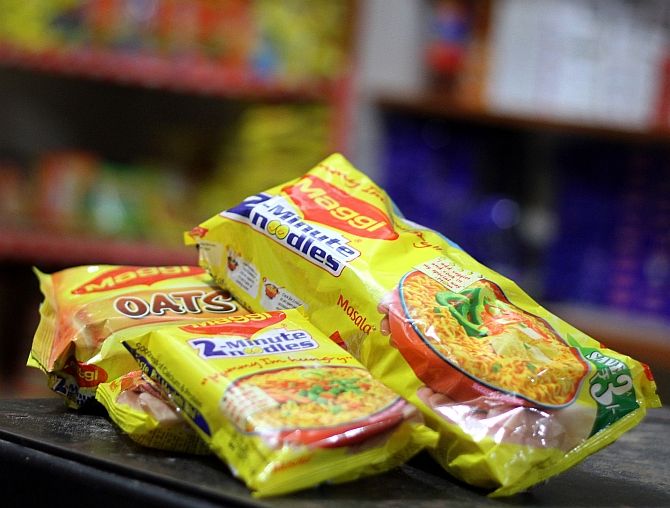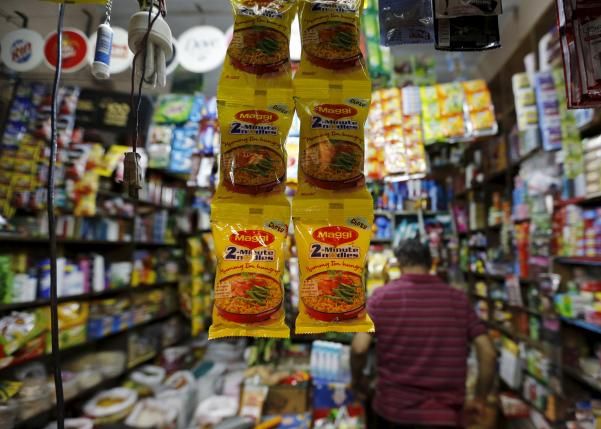Every new episode seems to simply reinforce Nestle's inherent inclination to put up the walls and hunker down.

About 25 per cent of Nestle’s revenues in India comes from the sales of the Maggi 2 Minute Noodles.
The company spends an estimated Rs 150 crore (of its Rs 450 crore annual advertising budget) on the instant noddle brand. No wonder Nestle’s response to the events leading up to the June 5 ban and recall of Maggi noodles, and a string of developments thereafter leading to the Indian government filing a lawsuit against the Swiss food firm’s Indian unit, has baffled experts.
Here five branding experts discuss what the company could have done to avoid the crisis from blowing up in its face.
Stand up, take it on the chin: Supriyo Gupta
Nestle needs no lectures or prescriptions on managing food crises. They have been at the centre of many a malevolent maelstrom over their food and promotions. Their long drawn wars over baby food is the stuff of many a case study. Every new episode seems to simply reinforce their inherent inclination to put up the walls and hunker down. The question is what did Nestle get horribly wrong?
Failed containment: When the issue first erupted, there was a healthy chance to keep it geographically locked up. Identify the factory that was the source for the suspect samples and lock in the batch. Contain. Isolate. Address. On the contrary, a dogged refusal to draw boundaries sucked the whole brand in.
The missing leader: Yes, there were no leaders coming out to bat for the jewel in the Nestle India crown. Not even a brand manager was out there defending the brand. The global crisis manual probably kicked in and a bunch of lawyers crossed out all meaningful communication for fear of suits. Well, they have one now worth Rs 640 crore and that would be an invitation to shut up even more. On the contrary, it is a great opportunity to raise the flag of, well, revolt.
Opening with the King: In no strategy of war is the King the opening gambit. The King is the reconciler, the person who makes the moves that open a new chapter. Here they rolled him in straight into FSSAI. His ideal job should have been to build the image of remedy and reconciliation. Putting up the global CEO was possibly a very European view of engaging the government and sorting out issues rather than dealing with the opinion outside.
No credible external endorsers: Nestle seemed to have created and existed in a cold world. Possible years of dealing with people as dealers, vendors, paid artists and ‘stakeholders’ meant there were no warm relationships across the board. It is fairly unprecedented that a corporate with such an extensive presence in the country didn’t have anyone standing up to bat for it.
Failing to stand up and take it on the chin: Somewhere between the clean chits of various food authorities and the rejections by Indian labs, there is a batch or two that may have fallen between the cracks. However, the biggest blunder in the episode was Nestle’s failure to stand up and take ownership of the product and the brand. All that was needed was for the India leadership team to man the ship and communicate leadership. To say, that we own this brand. We will investigate. We will see. And we will fix.
Moves that became inexplicable because they didn’t get communicated: Nestle recalled tonnes of Maggi and proceeded to incinerate them. Why? Who asked for it? There was possibly very sound logic in destroying products that would have expired if they had stayed on the shelf. But without explanation, it simply ended up looking like disposing off the evidence.
Yet, it continues to be a company that is in a reactive mode. There seems to be no real communication campaign in action. Much of the statements and speak seem to be heavily guided by artificial legal constraints.
Supriyo Gupta is CEO, Torque Communications.

Do not deny involvement: Rita Gunther McGrath
Nestle, the global food giant, has had more than its string of troubles lately, with some commentators arguing that the company actually veers into a space they call ‘evil’ in its business practices. So the company’s latest venture into really, really, bad publicity with its Maggi brand of noodles is unfortunately not completely out of character.
Despite an emergency effort by Nestle CEO Paul Bulcke to reassure consumers, including shredding his schedule for a two-day visit to Delhi, the leadership at Nestle really didn’t do a good job of crisis management. The old nostrums — do it all, do it early and do it yourself — were basically ignored in this case.
For starters, it’s clear that Nestle folks did not initially recognise the magnitude of the problem, magnified by the social media echo chamber.
The initial recall of Maggi by the folks in Uttar Pradesh took place on April 30. Nothing was done until June, when the media uproar was well advanced, and APCO Worldwide was appointed to manage its message in India.
Bringing in a crisis management communication firm after the crisis has already exploded leaves it too late. The firm was basically in denial that the questions represented a significant issue for it.
My colleague, John Kimberly, professor of management at Wharton, has some excellent ideas about what companies should do in a crisis situation.
He recommends a five-point crisis management strategy for companies in such situations to restore credibility: “One, acknowledge that there is an issue that needs to be examined carefully.
Two, buy time to get the facts. Three, do not deny involvement/ responsibility. Four, do not attempt to estimate the magnitude of the problem. And five, commit to a speedy but thorough investigation.” (source: https:// knowledge .wharton .upenn.edu/article/hot-water-lessons-from-the-maggi-noodle-recall-in-india/)
The Maggi incident also raises questions of whether operating in countries with different regulatory and enforcement standards creates new kinds of risks for large multinationals, as every misstep can be amplified by social media. For citizen stakeholders who feel powerless against what they may perceive as lax standards, social media provides a powerful way to draw attention to their issues. Can the Maggi brand recover? Possibly, but Nestle is going to have its work cut out for it to regain trust.
Rita Gunther McGrath is Associate Professor, Columbia Business School
 Bring in brand evangelists: Ramanujam Sridhar
Bring in brand evangelists: Ramanujam Sridhar
Maggi has been really a case of a poorly-managed crisis. Having said that I would also like to say upfront that it probably got a raw deal and was the victim of a witch-hunt. But on to what should have been done:
Who was minding the store? Every brand needs a custodian, more so a brand that is under crisis. Nestle’s response was muted, confusing and delayed if it was even made.
The brand custodian should have said: “I am in charge and will move heaven and earth to ensure that the consumer does not suffer and her health is not affected. I will identify, withdraw and meet all standard that the government decides. We will not compromise on consumer safety.”
Speed was not the essence: One of the biggest problems was that being a global company, Nestle’s speed of response is constrained. Today, in the reign of social media, we do not have this luxury. What Nestle did was to bolt the stables after the horses had fled. On the contrary, it should have quadrupled the speed of response.
So where was the consumer hiding? Let’s not forget Maggi is loved by people. A few generations have grown up on that snack. Where were those evangelists and why they didn’t come out and speak up— like Amitabh Bachchan did for Cadbury — that we trust it and have had it for years? The answer is not the mother and daughter ad but testimonials from real life consumers. They should have used real consumers.
Ramanujam Sridhar is Founder & CEO, Brand-comm.
Respond in real-time: Anil S Nair
Now that the Maggi saga has fully played out in full view of all of us, one can preach some pearls of wisdom with the ‘unfair’ advantage of hindsight.
Truth be told that what has happened to Maggi and, hence Nestle, is something that very few companies in India are prepared for. I am not sure if this is a marketing task or corporate affairs task or a legal and compliance task. So here is what Nestle could have done if they could rewind time.
Get up to speed: In this age of digital media you can’t wait even for an hour before you respond to an issue like this. You have to start responding/acknowledging in real time. It is not about giving out legally vetted official statement but engaging with the audience in some form so that one can’t be accused of ‘hiding’ from the controversy. If Nestle was out there facing the music from day one, things would have worked better for the company.
Show a human face:Nestle could have appointed an official ‘face’ who could reassure the consumers about their commitment to resolving the issue than merely give out delayed statements that lacked human touch.
Be proactive:Nestle should have recalled all the stocks proactively just to convey their commitment to the well-being of Indian consumers. This would have given a clear signal to the consumers that here is a company that is willing take losses but not willing to compromise on consumer confidence.
Communicate:Nestle should have opened all channels of communication — social, PR, advertising — soon enough to explain its position. They were slow off the block in this regard. It is not about saying the legally correct things but being seen as willing to talk — that is important.
Having said all this, these points are wisdom born out of hindsight than out of any best practice manual available on the subject.
Anil S Nair is CEO & managing partner, L&K Saatchi & Saatchi.

Focus on internal branding: Saurabh Uboweja
A company of the size of Nestle is not new to handling or managing crisis. But when you put a question mark on the equity of a popular food brand and one of the world’s top food companies, the best of your crisis management plans can go haywire.
Crisis related to food products surface frequently and research shows that it can take three/four years on an average for a large successful brand to recover from the equity dilution and loss in sales after a crisis. T
he larger your brand, the higher the risk it carries as the chances of it failing its own standards increase because of its level of penetration and reduced control over the supply chain before it reaches a consumer’s plate. There are, however, a few important steps one must take as a brand custodian during such a crisis:
First response: Timing your first response can be the most challenging decision during a crisis because you are in shock and are still gathering facts to formulate your communication. However, any delay of more than a few hours can be disastrous. Your first response must go out almost instantly, owning up to the crisis with a promise to supply more information and enumerating your action points.
One voice:During such crisis, everybody in your company has an opinion from your security guard to your CEO. It is important to focus on your internal branding first and limit the source of communication to a single point. This ensures consistency and builds both internal and external confidence in the brand during crisis.
Reduce messages: Fewer messages mean fewer speculations. Stick to the facts and share your firm official stand on the issues. Draft well thought out releases in advance by speculating all likely actions and reactions by the stakeholders.
Time it: Your messages must be timed with important releases from government authorities, the buzz in social media and reactions from other stakeholders. You need to be ready with your engagement strategy much before opinions start taking shape. Acting timely will give you rare opportunities to drift public sentiments in your favour by subtly influencing the discussions around your brand.
Saurabh Uboweja is CEO & Chief Brand Strategist, Brands of Desire.












 © 2025
© 2025